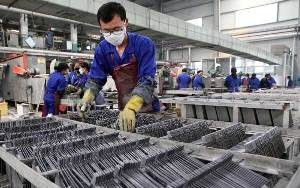A consultative committee advising the central government on “Made in China 2025” plan has identified on Tuesday, Sept. 29, 10 priority industries to upgrade the country's manufacturing sector and enable the country to shift from low-end manufacturing to more value-added output, the China Daily reported.
According to the consultative committee's list, these industries include new information technologies, aerospace devices, numerically controlled machines and robots, ocean engineering and shipping, and advanced rail equipment. Also in the list are electrical equipment, new energy vehicles, agricultural machines, advanced materials, and biological medicine and medical instruments.
The report said that the list will be updated by the committee every two years.
The Made in China 2025 plan was launched by the State Council in May and would enable domestic manufacturers to make technological breakthroughs in emerging industries.
Xin Guobin, the director of the office under the State Council that will spearhead the plan, said that the guidance will boost the country's manufacturing ability. Based on this guidance, the future industry policies will be implemented, Xin added.
According to the report, the major target of the plan is the significant increase in market share for Chinese servers, as China is aiming for a 90-percent market share for domestic servers in the finance and telecommunications sectors by 2025.
Analysts said that the aim of the plan is to further squeeze the markets of overseas vendors such as IBM Corp. and Hewlett-Packard Co.
Although China does not intend to oust imported IT hardware in the government procurement sector, tech giants such as IBM, Hewlett-Packard, and Cisco Systems Inc. and many other technology giants are feeling the effects of tightened data security standards and checks.
The report added that state-owned banks and telecom carriers are the biggest buyers of servers, local vendors only supply low- and mid-level products, while most overseas companies cater to high-end demands.
Through the plan, the government aims to increase the market share of domestic servers to 75 percent by 2020, the report said.



























